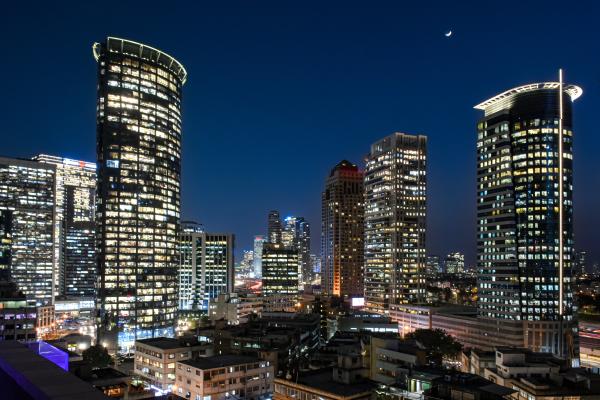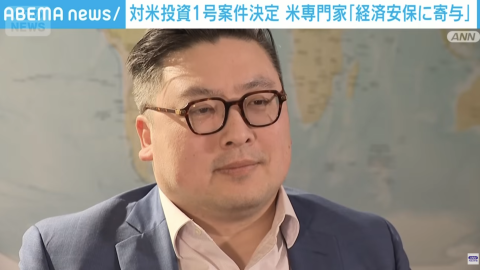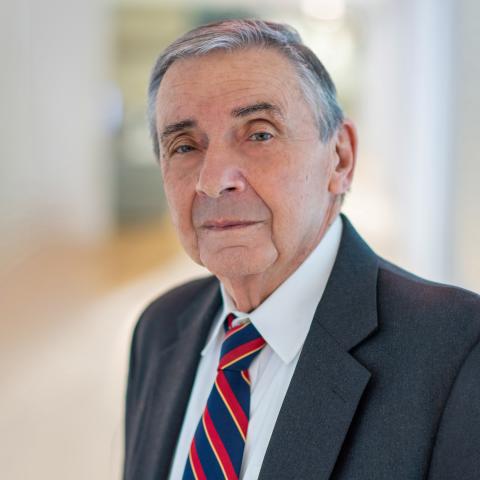
US-China Rivalry in the Middle East Conference
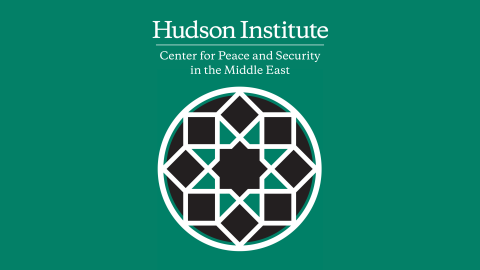
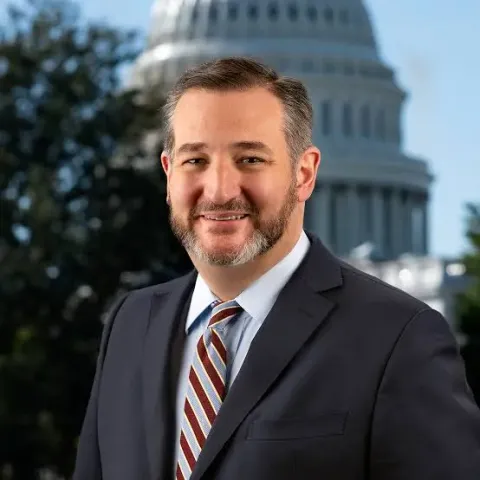
Unites States Senator, Texas
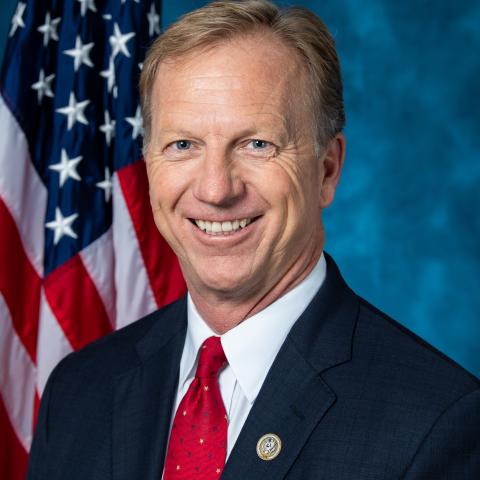
United States Representative, First District of Oklahoma
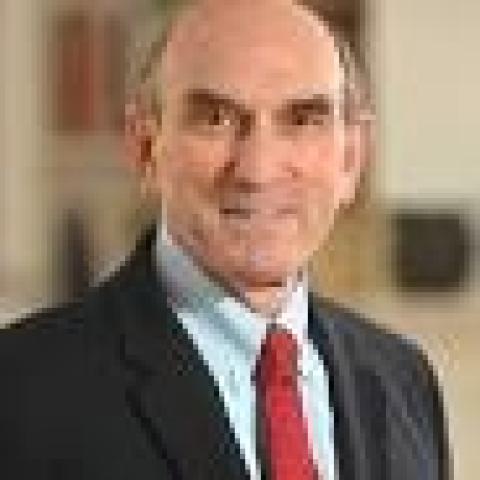
Senior Fellow, Middle Eastern Studies, Council on Foreign Relations

Senior Fellow and Director, Center for Peace and Security in the Middle East
Michael Doran is a senior fellow and director of the Center for Peace and Security in the Middle East at Hudson Institute.

Senior Fellow (Nonresident)
Mary Kissel is a nonresident senior fellow at Hudson Institute.

Senior Fellow (Nonresident), Center for Peace and Security in the Middle East
Bernard Haykel is a nonresident senior fellow with Hudson Institute’s Center for Peace and Security in the Middle East.

Senior Fellow
Joshua Meservey is a senior fellow at Hudson Institute, where he focuses on great power competition in Africa, African geopolitics, and counterterrorism.

Senior Fellow
Aaron MacLean is a senior fellow at Hudson Institute and the host of the School of War podcast.

Senior Fellow, Middle East Studies, Council on Foreign Relations

Senior Fellow
Thomas J. Duesterberg is a senior fellow at Hudson Institute and an expert on trade, manufacturing, economics, and foreign policy.

Former Nonresident Senior Fellow
Jonathan I. Hessen was a nonresident senior fellow in the Center for Peace and Security in the Middle East at Hudson Institute.

Executive Vice President
Joel Scanlon is executive vice president of Hudson Institute.

Senior Fellow, American Enterprise Institute

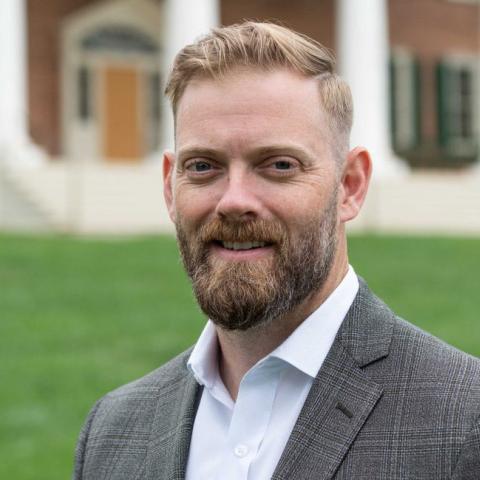
Adjunct Fellow
Garrett Exner is an adjunct fellow at Hudson Institute, where he writes and comments on US national defense with a specific focus on the use of special operations forces and gray zone competition.

Senior Vice President, American Foreign Policy Council

Former Fellow
Mike Watson was a fellow and deputy director of Hudson Institute’s Center for Strategy and American Statecraft.
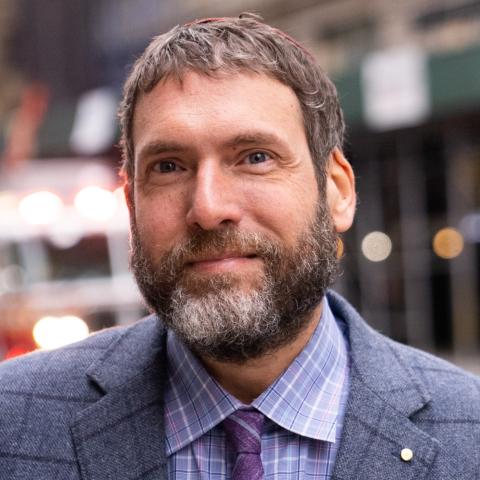
Senior Fellow
Liel Leibovitz is a senior Fellow at Hudson Institute. His work focuses on thinking about anti-Semitism as a national security threat.

Research Fellow, Center for Peace and Security in the Middle East
Zineb Riboua is a research fellow with Hudson Institute’s Center for Peace and Security in the Middle East.

Founder, 770 Strategies LLC

Public Policy Expert

George P. Shultz Fellow, Ronald Reagan Institute
China is expanding its strategic footprint across the Middle East through infrastructure, technology, and energy diplomacy. Amid Beijing’s global competition with the United States, shifting power dynamics and growing economic and technological entanglements are putting longstanding US alliances to the test in this crucial region.
Former policymakers and leading national security experts will join Hudson for a conference to assess how China’s growing influence is reshaping the regional order—and how the US should respond.
Hudson thanks the Public Interest Fellowship for supporting this conference.
Agenda
9:30 a.m. | Welcome Remarks
- Joel Scanlon, Executive Vice President, Hudson Institute
- Michael Doran, Senior Fellow and Director, Center for Peace and Security in the Middle East, Hudson Institute
9:45 a.m. | Panel Discussion: The Middle East Between Washington and Beijing
- Ray Takeyh, Senior Fellow, Middle East Studies, Council on Foreign Relations
- Elliott Abrams, Senior Fellow, Middle Eastern Studies, Council on Foreign Relations
- Michael Doran, Senior Fellow and Director, Center for Peace and Security in the Middle East, Hudson Institute
Moderator
- Liel Leibovitz, Senior Fellow, Hudson Institute
11:15 a.m. | Panel Discussion: Markets and Power: US-China Competition in the Middle East
- Thomas J. Duesterberg, Senior Fellow, Hudson Institute
- Mary Kissel, Nonresident Senior Fellow, Hudson Institute and Executive Vice President and Senior Policy Advisor, Stephens
- Bernard Haykel, Senior Fellow, Center for Peace and Security in the Middle East, Hudson Institute
Moderator
- Daniel J. Samet, Research Fellow, Ronald Reagan Institute
12:30 p.m. | Lunch Discussion: Restoring American Leadership in an Era of Strategic Rivalry
- Senator Ted Cruz, United States Senator, Texas
- Zineb Riboua, Research Fellow, Center for Peace and Security in the Middle East, Hudson Institute
2:00 p.m. | Panel Discussion: China’s Emerging AI and Tech Influence in the Middle East and Africa
- Jason Hsu, Senior Fellow, Hudson Institute
- Michael Sobolik, Senior Fellow, Hudson Institute
- Mike Watson, Associate Director, Center for the Future of Liberal Society, Hudson Institute
- Dan Blumenthal, Senior Fellow, American Enterprise Institute
Moderator
- Ethan Gutman, Founder, 770 Strategies LLC
3:15 p.m. | Panel Discussion: Are US Allies Shifting Away? Strategic Realignments and China’s Expanding Reach in the Gulf and Africa
- Joshua Meservey, Senior Fellow, Hudson Institute
- John Lee, Senior Fellow, Hudson Institute
- Jonathan Hessen, Senior Fellow, Hudson Institute
- Garrett Exner, Adjunct Fellow, Hudson Institute
Moderator
- Adhwaa Alsaleh, Public Policy Expert
4:30 p.m. | Israel’s Strategic Role in the US-China Rivalry
- Michael Doran, Senior Fellow and Director, Center for Peace and Security in the Middle East, Hudson Institute
- Ilan Berman, Senior Vice President, American Foreign Policy Council
Moderator
- Aaron MacLean, Senior Fellow, Hudson Institute
5:30 p.m. | Reception Remarks
- Congressman Kevin Hern, United States Representative, First District of Oklahoma
Transcript: Restoring American Leadership in an Era of Strategic Rivalry
This transcription is automatically generated and edited lightly for accuracy. Please excuse any errors.
Zineb Riboua:
Ladies and gentlemen, it is with great respect and appreciation that we welcome today’s keynote speaker, a statesman whose voice has been instrumental in shaping American foreign policy at a time of growing uncertainty, Senator Ted Cruz.
As a member of the Senate Foreign Relations Committee, Senator Ted Cruz has distinguished himself as a tireless defender of American interests and values on the world stage. He has constantly warned against the perils of appeasing adversarial regimes, spoken out boldly against Iran, its proxy networks, and led the charge in opposing the Nord Stream pipeline, understanding well the strategic consequences of energy dependence and authoritarian leverage. He is a man who fights for the truth and against delusions.
In his current role as a chairman of the Subcommittee on Africa and Global Health, Senator Cruz continues to advance a clear and forceful vision of US leadership. His work reflects a deep commitment to sovereignty, freedom, and the importance of confronting malign actors, including the rising influence of the Chinese Communist Party across critical regions, where we are honored by his presence today and grateful for his contributions to this urgent dialogue. Please join me in warmly welcoming the honorable Senator Ted Cruz.
Ted Cruz:
Good afternoon. We live in dangerous and often heartbreakingly tragic times. Last night’s act of depraved terrorism took two young beautiful souls from us, Sarah and Yaron. I know they were friends and colleagues of many in this room today. Yaron was one of the Israeli Embassy’s Middle East experts, and he might well have been here with us today. Sarah devoted her life to peace-building. They were murdered by a deranged anti-Semitic lunatic who was made more deranged by the flood of anti-Semitic incitement sweeping across the world.
Day by day and indeed minute by minute, the most outrageous lies about Israel and Jews are manufactured and amplified by global echo chambers spanning international organizations, social media, college campuses, the media, and increasingly world leaders and far too many American lawmakers. The result is predictably and infuriatingly more violence.
The murderer last night said, “Free, free Palestine,” after shooting them both. I will tell you those words for the better part of a year I heard every Saturday morning at 7:00 a.m., as I had pro-Hamas protesters in my front yard chanting them, ringing bells, screaming curse words, waking up the children in the neighborhood. They would arrive promptly at 7:00 a.m. on Saturday and they would leave promptly at 8:00 a.m. on Saturday for much of last year until one day they stopped. It was clear it was not organic. It was clear it was paid for. This was a job. They were punching in on a clock at 7:00. They were punching out at 8:00. And then one day, whoever was paying for it decided to stop paying for it. But they spread the hate and lies, and that’s dangerous.
For us, it’s incumbent to warn, to mourn, but then to act. We should counter lies and incitement with clarity. Unapologetic, rigorous, righteous clarity. Anti-Israel lies are lies. Anti-Semitic hate is hate, and there is a virtue in clarity. In national security analysis and practice, of course, clarity is essential.
Many of you have heard me talk about being on the South Lawn of the White House for the signing of the Abraham Accords five years ago. That week, the ambassadors of both the UAE and Bahrain said the exact same thing to me. They said, “We now understand that America stands unequivocally with Israel. We want to be friends with America, therefore we will be friends with Israel.” That is the virtue of clarity, and I will say our enemies have no problem with clarity.
Xi Jinping talks about, quote, world socialism and declares that, quote, realizing communism has been the party’s supreme ideal and ultimate objective because the Chinese Communist Party intends to displace the American global order and replace it with Chinese communism. They are building a military capable of global power projection and creating regional economic blocs excluding the United States because they intend to project power globally at the expense of core American national security interests.
The ayatollah chants, “Death to America and death to Israel,” because the ayatollah intends to do everything he can to wipe out Israel and murder Americans. Iran is enriching uranium that can be used for nuclear bombs because they intend to build nuclear bombs. They are developing missiles capable of detonating nuclear warheads above American cities because, I believe, if they are able, they intend to detonate nuclear warheads above American cities. And I’ll add that when Vladimir Putin declares that he intends to reconstruct the Soviet Empire, he means that too.
The political left loves to quote a line by the author Maya Angelou. “When someone shows you who they are, believe them.” Apparently, that principle applies to everyone except America’s enemies, who declare over and over again their intention to destroy us, to destroy our allies, and to murder as many of us as they can. If history teaches anything, it is that if somebody tells you they want to kill you, believe them.
There is no doubt that China represents the most significant long-term strategic geopolitical threat to the United States. They are waging a thousand-year war. There is also no doubt that the prospect of an Iranian regime acquiring nuclear weapons represents the most acute, immediate threat to America and our allies. And there is no doubt that over the last half-decade, they have coalesced into a very explicit alliance between Iran and China, along with Russia and North Korea, to help them achieve their goals.
I believe that fundamentally, China is a global threat that must be confronted globally, region by region. There are those who refuse to acknowledge the threat that China poses. When I first came to Washington to the Senate 13 years ago, I said then China is the greatest geopolitical threat facing America for the next hundred years. At the time, that was a very lonely view. Every Democrat disagreed and most Republicans disagreed. They looked at China and they saw nothing but dollar signs as far as the eye could see. I will say particularly in the wake of COVID, many people’s eyes have been opened up as to the threat that China poses, as to the lies they carry out, as to the murder, torture, genocide they carry out.
There are those who acknowledge that China is a threat but say, “We must narrow our focus to the regional threat it poses in East Asia.” I find that argument completely unpersuasive. One reason I find it unpersuasive is because of exactly what we’re here to talk about, China’s role in the Middle East. And within that region, I’ll talk about one example, the China-Iran alliance, and how that alliance enables both countries’ malign activities. Then we’ll go to questions.
The last time I was here at the Hudson Institute in May of 2023, I talked about the Iran-Russia nexus in the war in Ukraine. At the time, Biden officials were running our foreign policy. We were just over a year into the war in Ukraine. And I talked about how the Biden administration was funding both sides of the war simultaneously. We were spending billions of dollars to arm Ukraine and we were allowing what would amount to $140 billion inflow to Iran, which in turn was spent among other things on military infrastructure and drones and IRGC advisors sent to Russia to fight against Ukraine. And the Biden administration happily wrote checks on both sides.
That money was also used to finance Hamas and the October 7th terror attack against our Israeli allies. That attack was the worst one-day massacre of Jews since the Holocaust. It triggered an ongoing war and included Hamas murdering and kidnapping over 1,200 people, including dozens of Americans.
During the Biden administration, the CCP was by far and away the primary purchaser of oil from Iran. Iran and China signed a 25-year strategic partnership plan with a commitment from China to invest $400 billion in projects in Iran over that period. Four out of every five barrels of oil that Iran exports go to China, enabled by a ghost fleet that was roughly 70 ships at the beginning of the Biden administration, and that grew to over 400 ships by the end of the Biden administration. The oil metaphorically and literally fueled China’s economic and military buildup over the last four years.
When I used to ask Biden officials why they were allowing that trade to continue, the answer they would give repeatedly in hearing after hearing was essentially, “There’s nothing we can do about it.”
Compare these debacles to the policies and successes under the first Trump administration. Under President Trump as I said earlier, we had the Abraham Accords. American allies came together under American sponsorship and American leadership. The Biden administration in contrast alienated our allies and emboldened our enemies with predictable results. Our allies were pushed towards our enemies under Chinese sponsorship.
In 2023, Iranian and Saudi security officials met in Beijing and signed a deal to restore full-fledged diplomatic ties and reactive security cooperation. Biden officials responded to the announcement of the deal by saying, “We welcome the development.” Regardless of what the interest was or who sat down at the table, they said it would lead to an end to the war in Yemen or Houthi attacks. I suppose I’m a little less sanguine about it than they are. I find deepening alliances between hostile global and regional enemies of America to be a very unwelcome development in the world.
It’s worth noting that in October, 2023, the Houthis started firing missiles and drones at commercial ships in the Red Sea. Iran continued providing direct support, munitions and missiles, and also sent spy ships to the Red Sea to assist. It’s also worth noting that China, despite having a military base in Djibouti, did nothing other than engage the Houthis to protect their own vessels.
Again, the China-Iran dynamic is just one example, just in the Middle East of the global threat posed by the CCP and why it has to be countered globally, region by region. There are plenty of others that I’m sure we’ll get into and I want to thank all of you for being here. Hudson, for hosting. John Walters for all he’s doing here and Zaneb for putting on this event. And with that, let’s move to questions.
Zineb Riboua:
Well, Senator, thank you very much for your time and also for your strategic clarity at this time. But before we start, I would like to personally thank you for your kind words about Yran. I don’t know if you know this, but whenever I talk to Yran, he told me that it’s really thanks to you that he met his fiance.
Ted Cruz:
I did not know that.
Zineb Riboua:
Because they met at an event where you were speaking and they were big fans of yours and I wanted to tell you that.
Ted Cruz:
It’s heartbreaking.
Zineb Riboua:
So just to follow up on your keynote, but also on some of the key remarks you’ve made about the Iran-China axis. You’ve also always been clear that the Chinese Communist Party is really a serious long-term. How do you assess right now the current state of US-China rivalry in the Middle East, but also in Africa?
Ted Cruz:
Well, look, Africa is a major contested region. You go to Africa and right now there’s a running joke that the national bird of most countries in Africa is the crane because you have Chinese cranes everywhere. They are investing billions of dollars. Their belt and road initiative is systematically designed to buy allies, to corrupt them and to drive them away from the United States. And they are engaged in every single region of the world.
They are fighting a global battle. And they’re clear-eyed about it. I will say during the last four years, the Biden administration could not bring itself to stand up to China or anybody else. We saw four years of weakness and appeasement from the President. And if history teaches anything, appeasement doesn’t work. I mean, there’s a reason nobody here went to study at the Neville Chamberlain School of Foreign Affairs because history demonstrated it’s an abject failure.
I’m glad now, very glad President Trump is back in the White House because we once again have a commander in chief that our enemies are afraid of. That is really good and healthy. When you have bad guys that want to do bad things to you, it is far better to engage in deterrence rather than having a president they didn’t fear and didn’t respect.
You think about it, four years ago Joe Biden inherited a world with peace across the globe with the Abraham Accords, just having been signed, peace flowering in the Middle East and every single region of the world, he managed to screw up. That’s hard to do. I guess Antarctica didn’t get markedly worse, but pretty much the rest of it did.
Zineb Riboua:
Yeah, and you mentioned also the military base in Djibouti. And many people said, “Oh, it’s not a big deal. There are so many other countries there.” But in fact now China has a military base in the Red Sea, very close to Saudi Arabia and other things. And how do you see this, Beijing’s motives in the Middle East?
Ted Cruz:
Look, their motives are very directed towards us. Xi wants to topple America and displace America. And I don’t know that there is a country on earth that China is not pressing back on us and trying to achieve dominance over us. And far too often we’re not engaging and we’re not engaging with the tools and weapons we have.
One massive weapon we have is energy. America is the energy superpower on planet earth. We’re the number one producer of oil in the world and number one producer of natural gas. That it is an incredibly potent tool to both benefit our allies and to use against our enemies. And look, the President just finished his tour of the Middle East. I was very gratified to see countries in the Middle East want to be friends of America. By the way, I want to make a prediction. The Abraham Accords will be expanded in the next four years. And I think they will be significantly expanded, including most notably I believe the Saudis will join.
Zineb Riboua:
It seems that all indicators are going that way, especially because Beijing invested recently massively when it comes to tech infrastructure, AI, et cetera. They see the Middle East as an attractive market. And it seems that the United States through Trump is pushing for that as well. Are there other signs that you think are making United States posture better?
Ted Cruz:
Look, I think it comes down to number one, having a president and an administration that is willing to stand with our friends and stand up to our enemies. You look at across the globe, Israel, we’ve never seen a US administration that is more anti-Israel, that actively undermines Israel remotely to the extent that the Biden administration did.
All right, let’s take Iran. Let’s go back to the first Trump administration. In the first Trump administration, the two most significant foreign policy decisions were, number one, moving our embassy in Israel to Jerusalem. Number two, pulling out of the disastrous Obama-Iran nuclear deal. Both of those were battles within the first Trump administration. Both of those decisions, state and defense opposed. Rex Tillerson and Jim Mattis argued vociferously, “Do not move the embassy to Jerusalem because the enemies of America will be angry.” I went to the White House dozens of times making the case that we should move the embassy, that clarity is valuable. The president agreed with me, and he overruled his own Secretary of State and his own Secretary of Defense. Same thing on the Obama-Iran nuclear deal. State and defense argued, “Do not pull out of it.” I probably went two dozen times on that issue, and the president again made the right decision and pulled out of it, and here was the effect.
After he pulled out of the Iran nuclear deal, there were a series of . . . This is a pretty wonky and weedy group. I say that with admiration because I admire policy wonks who actually know how to get things done. But when we pulled out of the Iran deal, we were not done then. There were a total of seven civilian nuclear waivers that remained in place for so-called civilian nuclear research, including allowing the Iranians to do civilian nuclear research at Fordo, a facility built into the base of a mountain with Russia. Now, I don’t believe Iran should have anything, any centrifuges. We should insist on complete dismantlement, and I don’t think they should have civilian nuclear power. They’re sitting on a sea of oil. They’re not short on power. The ayatollah ain’t worried about climate change. They want nukes for one reason, to kill us.
As far as I’m concerned, I don’t want them to have anything that glows in the dark. The civilian nuclear waivers, there was a second battle that we engaged in, and the Trump administration ultimately revoked those waivers. Then the most consequential was the oil waiver. Even when we pulled out of the Iran nuclear deal, there was an oil waiver in place that allowed Iran to sell. At the time, they were selling roughly a million barrels a day. There was, again, a fight within the Trump administration about whether to end the oil waivers. This time, the lines were a little bit different. State argued do not end the oil waiver. They argued that it would drive up the global price of oil, which would drive up the price of gasoline here at home. The Department of Energy, which you would think would know something about energy, said, “That’s ridiculous. There’s plenty of global supply of oil. We can cut it off without materially impacting the price of gasoline.”
I engaged in that one vigorously. Again, the president agreed with me. He ended the oil waiver, and we now know as a factual matter who was right and who was wrong. Energy was right and state was wrong. When the oil waiver ended, Iran’s oil sales plummeted. They dropped from a million barrels a day to 300,000 barrels a day, and the global price of oil didn’t move at all. It had no impact at the gas pump. That’s what Biden inherited. When Biden came in, Iran was selling 300,000 barrels a day of oil. Their economy was in free fall, the regime was teetering. I think we had a real opportunity to see the ayatollah and the mullahs fall. What did Joe Biden and the Democrats do? They immediately stopped enforcing the oil sanctions. Iran’s oil sales, they had been at a million barrels a day, they fell to 300,000.
Under Joe Biden, they rose to 2 million barrels a day. That was over $100 billion that went straight to the ayatollah. Now, what did Iran do with that? Well, among other things, Iran provides over 90% of the money to Hamas and over 90% of the money to Hezbollah. In a very real sense, Joe Biden and Kamala Harris and every single Senate Democrat that voted with them for four years paid for the death squads on October 7th. Because when you send $100 billion dollars to a theocratic lunatic who screams, “Death to America,” and, “Death to Israel,” and he spends that money to pay terrorists to murder Americans and murder Israelis, then you have responsibility for the money you sent to the lunatics who are acting on what they say they’re acting on.
Zineb Riboua:
Definitely, and there’s . . .
Ted Cruz:
Sorry. I went on a bit of a rant.
Zineb Riboua:
No. It’s great to have this conversation because as you know, there is this . . . You’re talking about strategic clarity. Many people think that China is in the Middle East just out of coincidence, that it’s about geography, that they’re not interested in displacing US allies, but as a matter of fact, they are. You’ve talked about the United States siding with its allies, but do you see other measures that the United States can take in that regard?
Ted Cruz:
Yes. I think the most important . . .Look, I am the chairman of the Africa Subcommittee on Senate Foreign Relations. I spend a lot of time right now . . That’s new in this Congress, but I’ve been meeting with numerous leaders from Africa. Every country on earth looks at the marvel of the US economy, and they want to do business with us. America has a unique leadership role in the world. We have energy. Almost every country on Earth would rather our energy than our enemy’s energy. But under Joe Biden, they did everything they could to stifle US energy production. You look at Africa that has vast critical minerals. They want to develop those critical minerals. But under Biden, we didn’t lean forward and lead on that. I think the key . . . When I say when I talk to countries around the world . . . Look, China offers free money. Belt and Road can be very enticing because they shovel billions at you.
It’s a little bit like a drug dealer who goes to a junior high school and says, “Here. Here. Try a free sample.” Being friends with China does not work out well for anyone. When they come into a country and say, “We’ll build your infrastructure,” they, number one, don’t employ workers from that country. They bring in Chinese workers. They build shit, and often they trap the companies in a debt trap because they want to exercise control. Look, they’re doing it in Africa. They’re doing it in the Middle East. They’re certainly doing it in Asia. They’re doing it in South America and Central America. They’re doing it at the Panama Canal. You cannot find a region of the world . . . They’re doing it in Europe. They’re doing it in the Arctic. For all I know, they’re teaching penguins in Antarctica to speak Mandarin. I don’t know about that, but they might.
They’re doing it systematically. They’re waging a long-term battle. Now, what do we do in response to that? I think we need a systematic approach to defeat the Chinese in this battle modeled after the approach that won the Cold War against the Soviet Union. A number of y’all have been to my office, some many times. The dominant feature in my office is a gigantic painting. It’s about 20 feet wide. It is a painting of Ronald Reagan standing in front of the Brandenburg Gate. Above are the words, “Tear down this wall,” in German in the style of the graffiti on that wall. I think those are the most important words any leader has uttered in modern times. I think American leadership, we need to be a more attractive friend to countries around the world, and we need to be a more formidable enemy to countries around the world. We are in a global contest. Much like in the Cold War, the Soviet Union was doing the same damn thing.
China is not inventing a new playbook, but they are using . . . Unlike the Soviet Union, China has a much larger economic engine behind it. That makes it more dangerous, and so we need to combat the propaganda. We need to combat the espionage. We need to combat the theft of intellectual property. We need to combat the human rights abuses, and understand, just like the Soviet Union . . . Look, no one in their right mind wanted a shooting war between America and the Soviet Union. Two largest nuclear powers on earth firing missiles at each other is really bad for the existence of homo sapiens. Nobody wanted that. Nobody wants a shooting war between America and China because both countries have enough of an arsenal to exterminate all human life. But what we saw in the Soviet Union is you can press using all sorts of tools short of an actual shooting war, and that’s what we need to be doing with China.
Zineb Riboua:
Absolutely. Regarding the information warfare and also all the deceptive strategies, I guess you’ve also seen what . . . Thanks to the Russians, the Chinese, but also the Iranians have done in Niger where the United States had to leave a military base. How do you explain this almost a complicity of being a victim of this Chinese deception all the time? How do you explain that? It’s intriguing.
Ted Cruz:
Well, I do think that there are politicians in Washington, primarily Democrats, who fall into the category of useful idiots. There was a fabulous poster during the Reagan administration that had quotes from the useful idiots of that era who said, over and over again, “The Soviet Union is unbeatable. We cannot defeat it. We must accept.” Jimmy Carter said, “We must accept malaise. Put a sweater on.” All of the enlightened foreign policy view in this town in the Cold War is that we should embrace detente, which I think was French for surrender. And Ronald Reagan . . . Look, Reagan came in with clarity. Reagan stood up and said, “The Soviet Union is an evil empire.” And the Washington Cognizant, they were horrified at who could say such a thing. He said, “Marxism, Leninism will end up on the ash heap of history.” The Harvard faculty was very confused. They asked, “What’s your goal in the Cold War?” He said, “Very simple. We win. They lose.” That’s not nearly nuanced enough. That clarity is powerful. We need that clarity and we need that same force of vision.
Zineb Riboua:
Exactly. And one last question really about . . . You’ve mentioned how the Abrahamic courts are going to expand, that there’s going to be an Israel-Saudi normalization probably very soon because as we see the framework is being set for that and the foundations are. Are there any other predictions you would like to make in this regard or any last remarks?
Ted Cruz:
As I mentioned, the most acute danger we have right now is a nuclear Iran, and just last week I led a letter in the Senate with 52 Republican senators that made explicit that we agree strongly with President Trump’s repeated red line that the only potential agreement with Iran can be complete and total dismantlement of every single centrifuge. As President Trump put it, they can dismantle them kindly or not so kindly. I think the president is absolutely right. I don’t think every person in the administration agrees with that position. I think there are people in the administration who are more than happy to allow Iran to continue with centrifuges and even worse. And so I think there was value in having a completely united front in the Senate to say, “We stand with President Trump.” It’s worth noting and y’all know this, but Donald Trump is not an isolationist.
If you look at his policy in the first term, when he came into office, ISIS had a caliphate roughly the size of the state of Indiana, and he utterly and completely decimated and destroyed it. He took out General Soleimani, he took out Baghdadi, and in the second term, he’s been bombing the crap out of the Houthis. Those are not the actions of an isolationist. Now he is also not eager to get America into unnecessary wars. I agree with that as well. It is worth noting in eight years in the White House, the biggest country Ronald Reagan ever invaded was Grenada.
I believe in peace through strength. If you’re strong enough, your enemies don’t want to mess with you. I don’t think the Ukraine war happens if Trump had still been in the White House. I don’t think October 7th happens if Trump had still been in the White House. This is one thing the left doesn’t understand. Appeasement and weakness is provocative. It causes war. It causes the bad guys to be emboldened. I want the bad guys to be scared as hell about what the US president will do because it causes them . . . They will not behave well out of kindness in their heart. They will only behave well if they fear the consequences on the other side, and that’s the best way to avoid war. And so look, I think Hudson does a great job of focusing on these issues and I thank everyone here for getting in in the weeds on these issues because they matter and it is intensely dangerous right now, but I feel a level of optimism that is worlds away from where we were just a few months ago.
Zineb Riboua:
Wonderful. If you don’t mind, Senator, we’ll take two questions, one or two questions. Yes? That’s fine. Please introduce yourself and your affiliation.
Hazem Alghabra:
Senator, always a pleasure hearing you speak. Hazem Alghabra, former state department, currently with the Jerusalem Center for Foreign Affairs. I used to work assistance and I loved what you said about the cranes in Africa. I never thought we spent less than the Chinese. They spent infinitely smarter than us. I would love to know what yourself and your colleagues at the Senate are doing to support the new assistance strategy by President Trump, the safer, stronger, more prosperous?
Ted Cruz:
Yeah. Look, I think there is a role for foreign aid if it benefits America. I have long described my foreign policy as being . . .Typically the two poles in foreign policy are interventionist and isolationists. I disagree with both. I consider myself a third point on the triangle. I am a non-interventionist hawk. I think that also reflects where President Trump is and I also think it was Reagan’s piece through strength. I think those are all the same principle of, “Be strong enough that you don’t need to go to war,” but it also means that the touchstone for all foreign policies should be the vital national security interest of the United States.
So foreign aid plays a role if it’s benefiting America. And I think if you look at USAID, it became a political piggyback bank for the radical left to advance their ideology but it was doing nothing to benefit America. When you’re spending millions of dollars on sex change operations in Guatemala, you’ve plainly lost sight of what’s supposed to be the objective. And so I think we ought to focus on real material benefits to America. Does it make it safer? Does it make us stronger? Does it make us more prosperous? And I think the process of getting rid of waste, fraud, and abuse is healthy to then focus the resources on areas where it really matters.
Zineb Riboua:
Another question?
Speaker 3:
Good afternoon. I am from Israel’s Institute for National Security Studies and the Washington Institute, could you focus on what’s your main concerns of China in the Middle East and what are your main expectations from your allies in the Middle East?
Ted Cruz:
Look, I think China in the Middle East is trying to do what it is trying to do in every other region of the world, which is exercise power and do so in a way that harms America and displaces American roles and makes countries dependent on it. China seeks, I believe, global domination. They’re not seeking to be friends with countries, they’re seeking to dominate countries and so to allies and even to countries that are somewhere in between, I think China is a very bad friend to have and America should be a very good friend to have.
They’re doing everything they can to displace America and to ensure continued dominance. I don’t think it’s in Europe’s interest for China to be dominant. You look at something like Huawei. Huawei, they come in and say, “Hey, we’ll give you really cheap telecom equipment. Isn’t that great? Just one little detail. We’re going to spy like crazy on it.” Huawei is not a telecom company. Huawei is a spy agency. The first Trump administration, the United Kingdom was contemplating using Huawei telecom equipment. UK is part of the Five Eyes Network where we share our most sensitive secrets. And something I said at the time . . . I was actually interviewing Nigel Farage on my podcast. I do a podcast called Verdict with Ted Cruz three days a week and Nigel was on and we were talking about it and what I said is I said, “You know what? Four Eyes are better than Six Eyes.”
I said, “I love the Brits.” In fact, I’ve joked that our home is a mixed marriage because Heidi’s a Francophile and I’m an Anglophile so it works. But I said, “I love the Brits, but if the Brits are going to put in telecom equipment that lets China see everything we send them, we’re not going to be able to send them things because I’m not interested in giving them to China.” And it’s interesting, actually, I think COVID changed the views in the UK on the dangers of giving Huawei that position. China is looking to exercise power and I think it is to the detriment of everyone they get in bed with.
So my advice to all our allies is don’t get in bed with China. Instead do business with us as a friend and ally. It works out much better or at least it should and we should do everything we can to make sure that it does. All right. And I think there is a vote on the Senate floor because my guys are getting highly agitated, so I have to go vote. But thank you. You guys are amazing. I appreciate it.
Zineb Riboua:
Thank you, Senator.
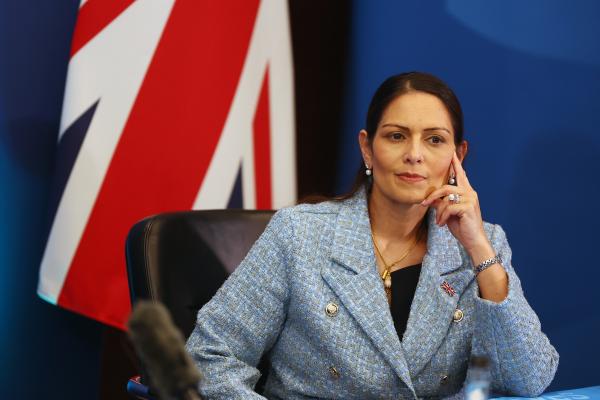
UK Shadow Secretary of State for Foreign, Commonwealth, and Development Affairs the Rt. Hon. Priti Patel, MP, will join Hudson for a conversation on the future of the special relationship and what the adoption of a conservative foreign policy would mean for Britain and the transatlantic alliance.
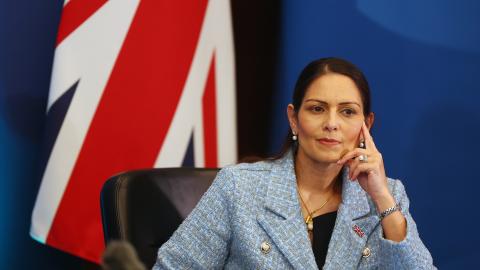



Join Distinguished Fellow Mike Gallagher and Congressman Rob Wittman (R-VA) for a discussion on the congressman’s recently introduced Securing Essential and Critical US Resources and Elements (SECURE Minerals) Act and Congress’s role in securing America’s economic security.

